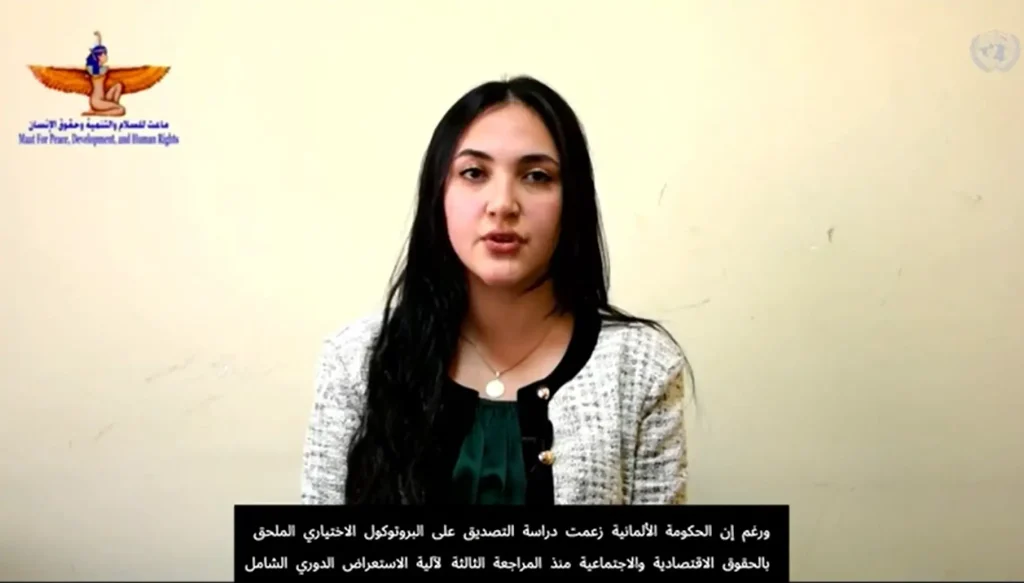At the United Nations Office at Geneva housed at the Palais des Nations, Maat Reviews Egypt’s UPR Mid-Term Report
Okeil: There is still an opportunity to fulfill the remaining pledges in order to improve the human rights situation in Egypt
Nourhan Mustafa: The file of women's rights in Egypt has witnessed positive breakthroughs in recent years
Roberto Caputo: The review process helps implement the SDGs
Maat for Peace, Development and Human Rights held today, Friday, September 30, 2022, a symposium entitled “Human Rights in Egypt: In the Light of the UPR Mid-Term Report”, at the United Nations Headquarters in Geneva, on the sidelines of the activities of the 51st session of the Human Rights Council. The symposium was attended by a number of representatives of international missions, civil society organizations as well as human rights experts and media professionals participating in the 51st session of the Council, which kicked off on September 12 and will continue until October 7, 2022.
During the symposium, Maat presented the report it prepared, which monitored and documented the human rights situation in Egypt over the past two and a half years, precisely since the UPR 3rd Cycle, from November 2019 until June 2022. By presenting the report, Maat seeks to assess the progress made in the implementation of the commitments that the government has voluntarily accepted, highlight the commitments that have not yet been implemented so far, and provide a set of recommendations to the Egyptian government.
Egypt's human rights record was reviewed by the UPR for the third time on November 13, 2019. During the adoption session of the UPR outcomes in January 2020, it received (372 recommendations), of which it accepted (294 recommendations). Having analyzed the 372 recommendations made to Egypt, Maat for Peace found that the recommendations covered 5 main axes; namely: accession to international agreements and cooperation with human rights mechanisms, legal and institutional framework, civil and political rights, economic, social and cultural rights, and the most vulnerable groups. Underlying these axes, (27) topics addressing strengthening the human rights situation in Egypt have emerged.
The report indicated that Egypt has made progress in some files, especially with regard to civil and political rights, given the launch of the national strategy for human rights, the initiation of the National Dialogue, the reactivation of the Presidential Pardon Committee, the near closure of Case no. 173 of 2011, known as the “NGO Foreign Funding Case”, and the issuance of Associations Law and its implementing regulations. With regard to the political empowerment of youth, the report indicated that the state has taken commendable steps in this regard, 60% of the newly appointed leaderships, which number is 39 governors and deputy governors, are youth.
During the symposium, Ayman Okeil, the international human rights expert and President of Maat, said that the main objective of establishing the UPR mechanism is to help governments improve human rights conditions and to engage civil society in the process of implementing the recommendations voluntarily accepted by the government. This process would strengthen the relationship between state institutions and civil society institutions, and allow both parties to work seamlessly hand in hand to achieve a shared objective; that is developing a national plan to promote human rights situation, such as the National Strategy for Human Rights launched by the government in September 2021.
Okeil stressed that there is still an opportunity to fulfill the remaining pledges in order to improve the human rights situation in Egypt. However, this is only possible through the concerted efforts between the executive, legislative and judicial authorities and the national human rights bodies and civil society organizations so that these recommendations are implemented on the ground through the implementation of the axes of the national strategy, which aims to advance human rights in Egypt.
For her part, Nourhan Mustafa, Director of the International Humanitarian Law Unit at Maat, pointed out that the file of women's rights in Egypt has witnessed positive developments in recent years, especially with regard to women's empowerment and their participation in political life, in conjunction with the endeavors to promote gender equality at the legal and practical levels, by restructuring the institutional and policy framework to ensure eliminating discrimination against women and promoting gender equality. Women’s rights were among the priorities of the National Strategy for Human Rights, the national strategy for the empowerment of Egyptian women, among other strategies to combat violence against women and female genital mutilation and to prevent human trafficking.
During the symposium, Roberto Caputo, an Italian researcher and member of the Peacemakers Forum, presented the axes of the recommendations made to Egypt and the underlying themes. Furthermore, he stressed that the UPR helps implement the sustainable development goals, as the primary goal of the United Nations High Commissioner for Human Rights and all its bodies and mechanisms, including the review mechanism, in ensuring the implementation of the sustainable development goals in a manner consistent with international human rights standards.
At the conclusion of the symposium, a set of recommendations were made to improve the human rights situation in Egypt, topped by the necessity of accession to the international conventions that Egypt has not yet acceded to, as well as joining the Optional Protocol to the Convention against Torture, and submitting national reports to treaty committees on predetermined dates. In a final remark, Okeil announced that Egypt is witnessing a human rights breakthrough, especially after launching the National Strategy for Human Rights, declaring 2022 as a year for civil society, launching a National Dialogue, and releasing a number of pretrial detainees who have exceeded the period of pretrial detention. Okeil called for the need to find alternatives to pretrial detention, and recommended the need to reduce the number of crimes punishable by the death penalty, amend national legislation to be in line with international human rights conventions and the Egyptian Constitution, and adopt a law punishing all forms of violence against women.















